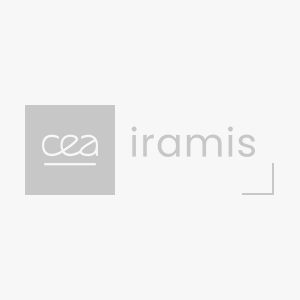Domain, Specialties : PHYSICS
Keywords: ultrafast optics, atomic and molecular physics, quantum optics
Research Unit : LIDYL/ATTO
Summary
The aim of the internship is to generate attosecond pulses using a new high-power Ytterbium laser and to use them to investigate the ultrafast photoemission dynamics of gases, in particular, to study in real time the decoherence resulting from electron-ion entanglement.
Full description
Recently, the generation of attosecond pulses (1 as=10−18 s) has allowed the exploration of matter at the electron intrinsic timescale, and was awarded the 2023 Nobel Prize in Physics [1]. These ultrashort pulses are generated from the strong nonlinear interaction of short intense laser pulses with gas jets [2]. A new laser technology based on Ytterbium is allowing an increase in average power/reprate of more than one order of magnitude as compared to the current Titanium:Sapphire technology. This opens new prospects for attosecond spectroscopy, e.g., studying in real time the quantum process of photoemission, shooting the 3D movie of electronic wavepacket ejection [3,4], and studying quantum decoherence resulting from electron-ion entanglement [5].
The experimental work will include the development and operation of a setup installed on the ATTOLab laser platform allowing: i) the generation of attosecond XUV pulses from a new Ytterbium laser, ii) their characterization using quantum interferometry, iii) their use in photoemission spectroscopy. The student will be trained in ultrafast optics, atomic and molecular physics, quantum optics and will acquire a good mastery of charged particle spectrometry.
The internship will be continued by a PhD project in the frame of a recently funded European Network QU-ATTO (https://quatto.eu/), opening many opportunities of joint work with European laboratories. Due to the Mobility Rule, candidates must not have resided (work, studies) in France for more than 12 months since August 2022.
- https://www.nobelprize.org/prizes/physics/2023/summary/
- Attosecond synchronization of high-harmonic soft X-rays
Y. Mairesse, A. de Bohan, L. J. Frasinski, H. Merdji, L. C. Dinu, P. Monchicourt, P. Breger, M. Kovačev, R. Taïeb, B. Carré, H. G. Muller, P. Agostini, and P. Salières, Science 302 (2003) 1540. - Attosecond dynamics through a Fano resonance: Monitoring the birth of a photoelectron
V. Gruson, L. Barreau, Á. Jiménez-Galan, F. Risoud, J. Caillat, A. Maquet, B. Carré, F. Lepetit, J.-F. Hergott, T. Ruchon, L. Argenti, R. Taïeb, F. Martín , and P. Salières, Science 354 (2016) 734. - Anisotropic dynamics of two-photon ionization: An attosecond movie of photoemission
Alice Autuori, Dominique Platzer, Mariusz Lejman, Guillaume Gallician, Lucie Maëder, Antoine Covolo, Lea Bosse, Malay Dalui, David Bresteau, Jean-François Hergott, Olivier Tcherbakoff, Hugo J. B. Marroux, Vincent Loriot, Franck Lépine, Lionel Poisson, Richard Taïeb, Jérémie Caillat, and Pascal Salières, Science Advances 8 (2022) eabl7594. - Quantifying decoherence in attosecond metrology
C. Bourassin-Bouchet, L. Barreau, V. Gruson, J.-F. Hergott, F. Quéré, P. Salières, and T. Ruchon, PRX 10 (2020) 031048.
Location
CEA Saclay, Site de l’Orme des merisiers, 91 Essonne, France
Internship conditions
- Internship duration: 5 months
- Level of study: Bac+5
- Training: Master 2
- Continuation in PhD thesis: Yes
- Application deadline: 2 janvier 2025
Experimental skills
Language : English
Useful methods and technics:
- Generation of high-order harmonics of intense laser beams
- Characterization of ultrashort laser pulses
- Spectroscopy of charged particles
- Vacuum technology
Computer languages and software: Python
Links
- Site web du laboratoire : https://iramis.cea.fr/lidyl/atto/
- Supervisor’s personnal web page
Supervisor
Pascal SALIERES
Phone: 0169086339
Email :
Head of the laboratory
Pascal SALIERES
Phone: 0169086339


